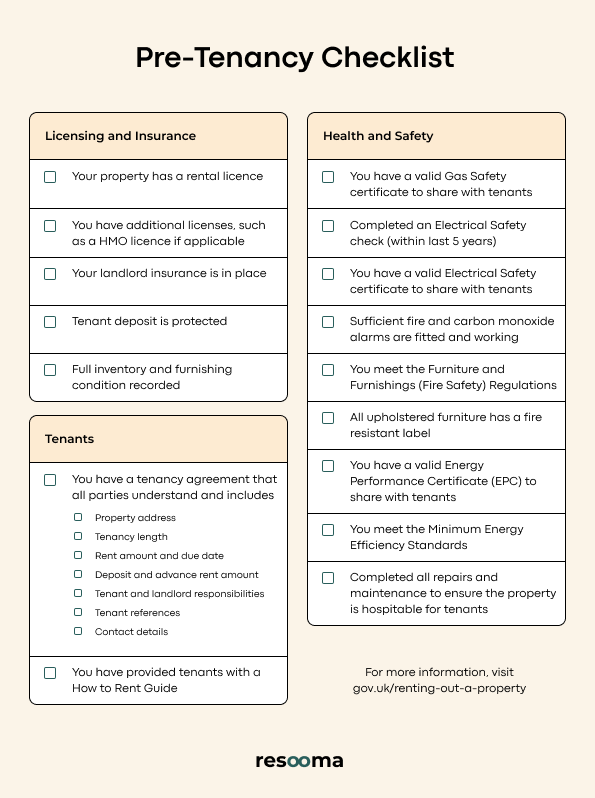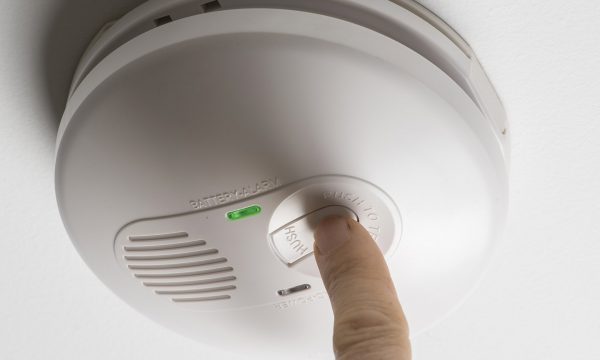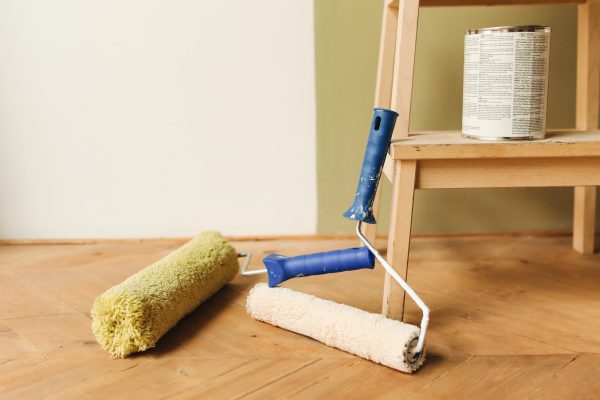 - minute read
- minute read
As the new academic year fast approaches, students will want to move into their new rentals quickly. All landlords and agents will likely want the same to reduce void periods. However, you have to ensure the property you are letting is safe and secure pre-tenancy.
The paperwork surrounding move-ins pre-tenancy can be enormous and the organisation haphazard and daunting. There are several legalities to consider and things you must do to ensure tenants can live safely and happily in your property. That’s why Resooma has put together this checklist of what you need to do pre-tenancy, ensuring a smooth move for both you and your tenants. We’ll also include a checklist* that you can download to keep track of what you need before the move-in.
Here’s our advice on what you need to do for your tenants and property pre-tenancy.


What licence you need and if you must have one depends on the type of property you have. There are three types of licensing that you can have for your property:
It’s wise to ask your council or local authority if you need a licence so you can let your property legally.
You aren’t obligated to have landlord insurance. However, it is in your best interests to have one in place, and most buy-to-let mortgages want you to have it. By having landlord insurance, you can ensure both your property and finances are protected if your property is destroyed in events such as a fire or flood, tenant injury, and even loss of rent.
There are insurance policies available for your property and its furnishings and other items. By ensuring your property’s inventory, you can replace these items in the event of fires, floods, accidental damage, and more. That way, you can make a claim and reduce the costs.
You have the option of accepting the first month’s rent, but you’re not obligated to take it. For a security deposit, you must legally put it into a government-approved tenancy deposit scheme (TDP) within 30 days of receiving it. You have a choice of three schemes, of which you can find more information on each here.

We advise that you make an inventory of your property’s furnishings and items, as well as their condition before tenants move in. Not only can you use this later to assess the property and furnishings on move-out, but it ensures that you and tenants can communicate about any problems that arise later.

Legally, you must do an annual gas safety check. Hire a qualified gas engineer to check the gas and ensure there aren’t any problems within your property.
Once you receive a new certificate, you must give the current tenants a copy of your new gas safety certificate within 28 days. If you have new tenants, legally, you must also provide them with a copy of your gas safety certificate.
A qualified electrician must perform an electrical safety check every five years. By hiring a qualified electrician to check your property for electrical safety, they can check wiring, sockets, and fuse boxes. They can also check for potential fire hazards.
Just like for Gas Safety, you’ll receive a new certificate after the electrician completes their check. Legally, you must give your tenants a copy of the new electrical safety standards certificate within 28 days. If you have new tenants, you still legally must provide them with a copy of the certificate.

Landlords and agents must have one smoke alarm installed on at least every property floor by law. You must install carbon monoxide detectors where there is a solid fuel-burning appliance (i.e. coal fires, fireplaces, etc,). Make sure to test your detectors and ensure they’re working before tenants move into the property. If you fail to follow these rules, you could be fined up to £5000.
Any upholstered furniture such as beds and sofas need to have a fire-resistant label. Typically, the regulations won’t cover items like curtains and carpets, but it’s still essential to ensure fire safety with these in mind.
For HMOs, you’ll need to provide your tenants with fire extinguishers and blankets. It is also a legal requirement for HMOs to have fire exit signs above fire escape exits.
For more information on the Furniture and Furnishings (Fire Safety) Regulations, click here.
You must have an Energy Performance Certificate for your property. EPCs will have information about your property’s energy use, the typical costs, and advise you how to save money by using energy efficiently. Again, you’ll need to provide a copy of an up-to-date EPC to your tenants. EPCs are normally valid for ten years, and you can face a fine if it isn’t valid. Your property also needs to meet the Minimum Energy Efficiency standards; it is illegal to let properties that have an EPC rating of F or G.
For more information on EPCs, you can read about them here.

It is more professional to finish your repairs and decorations before tenants move in. Hazards such as unstable supports, faulty wiring, or gas leaks must be sorted pre-tenancy. You could be committing a criminal offence by allowing tenants to live inside your property, as these hazards could endanger their lives.
You are allowed to enter your property to carry out repairs or inspect it if you give 24 hours’ notice. If it is an emergency, you might be able to access it quicker.

It’s essential to have a transparent tenancy agreement in writing for both you and your tenants. You should include important information such as:
Both parties should be transparent in communicating their expectations and responsibilities, especially with rent and bills. If you have concerns with the payment of bills, especially with utilities, it may be beneficial to have an inclusive bill.
We can help you with our bills inclusive service Resooma Bills. You can include your rent and utilities, from electricity to water to WiFi. 72% of tenants prefer renting with bills included, meaning the increase of tenants renewing tenancies, an easier time managing payments, and reduced void periods. We’ll include all your bills in one monthly invoice, and better yet, we’ll set it up for you, meaning you’ll have more time to prepare for your new tenants moving in. As a bonus, you can even boost your commission by referring your tenants to Resooma.
Legally, you are required to give the government guide on ‘How to Rent’ to new tenants upon move-in. The guide instructs tenants on private renting in an assured shorthold tenancy (AST) directly from a landlord or a letting agency.
Organising your property pre-tenancy doesn’t have to be frustrating. Ensure you’ve followed all the steps you need to let out your property legally by downloading our pre-tenancy checklist to keep you on track. For more information on Resooma Bills, click here. If you’re not quite at the move-in stage yet and wonder how to attract tenants, check out our blog post on how you can best advertise your property.
*This checklist has been created in alignment with England’s requirements for rental properties. If you’re interested in Scotland’s requirements, you can find more information here.



All your utility bills in one monthly payment, split between housemates
Get a quote


All your utility bills in one monthly payment, split between housemates
Get a quoteFinding his article helpful? We’ve got plenty more helpful articles on there way. Join our Savvy Sunday mailing list